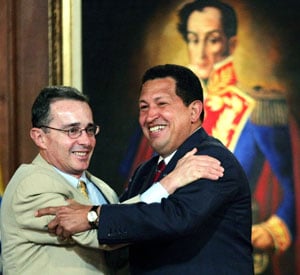
Colombian President Uribe and Venezuelan President Chavez hug, as Latin American Independence hero, Simon Bolivar, looks on. Source: Google Images
Latin America is not usually high on the list of hotspots for geopolitical analysts. Yet Hugo Chavez is threatening war against neighboring Colombia. (See the note below from a JPMorgan publication today.) Venezuelan President Chavez is America’s nemesis in the hemisphere, and Venezuela shares a long border with Colombia in the north of South America, facing the Caribbean. The word is that Chavez is on friendly (financial) terms with the FARC, the murderous, drug-dealing insurgency that has plagued Colombian society for decades. Yet Venezuela and Colombia are also important trading partners, though this trade has suffered amid recent tensions. Chavez doesn’t like the close military ties Colombia has fostered with the United States, quietly intensified by the Obama administration earlier this year. Meanwhile Chavez buys arms from US global competitor, Russia. Conflict in Latin America has been rare in recent years, though there was a cross-border flare-up in early 2008 between Colombia and Ecuador, currently led by Chavez’s nationalistic ally, Rafael Correa, who won a second term earlier this year. Apparently Correa allowed the FARC to operate across the border from Colombia, prompting the government of Alvaro Uribe to launch a raid against a FARC camp in Ecuador.
Like Iran in the Persian Gulf, Venezuela wishes to be a regional power countering local U.S. allies, wielding its oil wealth to make arms purchases. The best the U.S. could do to counter Venezuela’s threats is to move ahead with the Colombian free trade agreement, pushed aggressively by George W. Bush and scuttled by Democrats in Congress, including then Senator Barack Obama. See a note on this I penned a year and a half ago. President Bush openly talked about America’s strong alliance with Colombia. It might be worthwhile for President Obama to do the same.
From JPMorgan’s Emerging Markets Today, 11/10/09
Colombia/Venezuela: Escalating political noise
Julio CallegariAC (55-11) 3048-3369 [email protected]
Ben RamseyAC (1-212) 834-4308 [email protected]
Over the weekend, Venezuelan President Hugo Chavez told
his military and civil militias to prepare for a possible war
with Colombia, saying that “the best way to avoid a war is
to be prepared for one.” Chavez has been saying that the
military co-operation pact signed in October between
Bogota and Washington could set the stage for a US
invasion of Venezuela. The Colombian government, in turn,
has been highlighting that the agreement with the US is
intended to fight drug trafficking and insurgents within
Colombia, and responded to Chavez’s threats in a statement
saying “Considering the threats of war enunciated by the
government of Venezuela, the government of Colombia
proposes going to the Organization of American States and
the Security Council of the United Nations.” We remain of
the view that an actual armed conflict will not ensue,
particularly because the Venezuelan military would be
reluctant to actually fight Colombia (indeed, Chavez
would be entering dangerous territory if he sought to force
them). However, the threat of further deterioration of the
bilateral trade relationship is real. Indeed, we highlighted
last week that total Colombian exports decreased 11%oya in
September (the latest official figure available) while exports
to Venezuela dropped 50%. Moreover, partial data from
Customs, suggest that while total exports fell about 15%oya
in the first three weeks of October, exports to Venezuela
plunged 80%oya. The ongoing deterioration in Colombia’s
relationship with Venezuela should hurt bilateral trade even
more in the coming months.